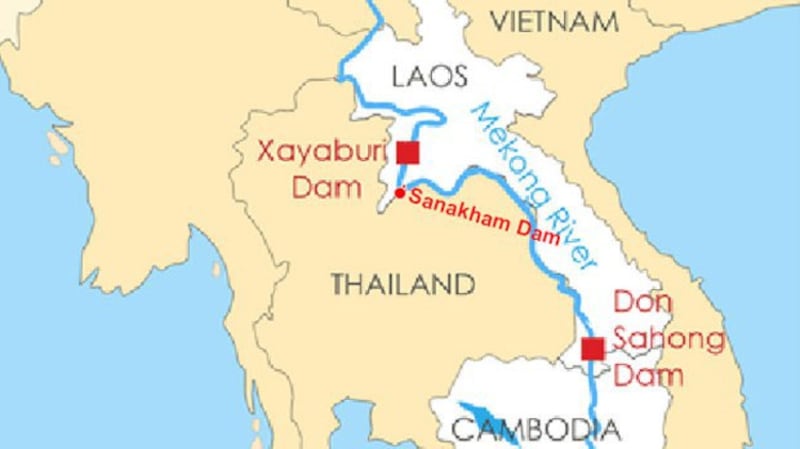Thailand might not purchase electricity from a large-scale Mekong River dam project in next-door Laos due to a lack of clarity on its potential impact, a Thai government representative said.
The Lao government has moved forward plans to build the Sanakham Dam, which would be the country’s seventh large dam on the Mekong River, and a major cog in the country’s ambitious strategy to become the “Battery of Southeast Asia” by selling power to other countries.
The 684-megawatt dam, with a projected completion date of 2028, would join the currently operational Xayaburi and Don Sahong dams. In various stages of planning are four dams: Pak Beng, Pak Lay, Luang Prabang, and Phougnoi.
But during a news conference in Bangkok on Nov. 24, the secretary-general of the Office of National Water Resources of Thailand (ONWR) said that the project might be getting ahead of itself.
“Earlier, we, the Thai committee, discussed whether this project is good or not. The project must respect our right to buy or not to buy power. If we have other sources that will not have impact on us, we’ll buy power from those sources,” said Secretary General Somkiat Prajamwong.
“We have not yet agreed to buy power from this project. The Energy Ministry is discussing conditions, and the condition may be that the source have no impact on Thailand… We need more clarity all potential impacts of the project,” he said.
Somkiat Prajamwong said that whether the power is expensive or cheap is less important than the dam’s impact, from Thailand’s perspective. He also pointed out that Thailand so far has only signed a power purchase agreement (PPA) for the Xayaburi dam.
After the conference, the Secretary General told RFA’s Lao Service that Sanakham would “certainly have impact on Thailand.”
“We’re not saying that the dam should not be built, but if they are not clear about its impact, we cannot accept that. We are still concerned, because so far, we have not received all the information about the dam or its impact,” he said.

The Bangkok Post reported Nov. 25 that he had told the media that Thailand has a power surplus so large that buying more from Laos is not necessary.
The report said that Thailand’s cabinet was concerned about the ecological impact of the Sanakham Dam and that it would conduct public hearings in eight Thai provinces along the Mekong River, a reversal on a previous decision not to.
Another potential issue with the dam is its effect on Thailand’s national security, because it could alter the course of the Mekong, which serves as the international border between Laos and Thailand.
Subject to Thai approval
Several experts told RFA that as the impact of the dams becomes more apparent, Thailand is recognizing that it has more of a responsibility to protect the Mekong River.
"There is no doubt that the Sanakham dam would cause serious social and environmental impacts in both Laos and also Thailand. It appears that the Thai government and people are becoming increasingly aware of these impacts,” Ian Baird of the University of Wisconsin-Madison told RFA Nov. 30.
“If Thailand decides not to buy the electricity from the dam, which appears to be increasingly likely, there is no way the project could move ahead, because there are no other markets for the power,” he said, adding that Thailand is in a unique position where it can determine whether more dams on the Mekong are constructed or not.
Meanwhile, Mekong River expert Brian Eyler of the Stimson Center told RFA that the ONWR was one of the only government agencies in Southeast Asia to acknowledge the Mekong is on the brink of crisis.
“Somkiat rightfully points to how dams are killing the Mekong’s natural flow cycle and robbing the river of its sediment supply. And for the first time he publicly states that Thailand doesn’t need power from more mainstream dams in Laos. Clearly if Laos has no buyer for power from dams, there’s little need to build more of them,” Eyler said.
But Lao government officials have said that the project is crucial to Laos’ development plans, and they have options if Thailand backs out.
“Laos has the right to build this dam. If we can’t sell power to Thailand we may sell it to others. We have many different alternatives, so this project will be built,” an official the Lao Energy and Mines Ministry told RFA on Nov. 26.
At the Nov 24. Bangkok press conference, Bounkham Vorachit, vice-minister of the Lao Ministry of Natural Resources and Environment, said in her opening remarks that Laos would “ensure that all serious issues are addressed before the project proceeds.”
She said the dam was a crucial part of Vientiane’s plan to export 20 gigawatts of electricity to neighboring countries by 2030, mostly from hydropower.
Laos has built dozens of hydropower dams on the Mekong and its tributaries, with ultimate plans for about scores more hoping to export the electricity they generate to other countries in the region. It is preparing to build scores more dams in the years ahead.
Though the Lao government sees power generation as a way to boost the country’s economy, the projects are controversial because of their environmental impact, displacement of villagers without adequate compensation, and questionable financial and power demand arrangements.
Reported by RFA’s Lao Service. Translated by Max Avary. Written in English by Eugene Whong.
